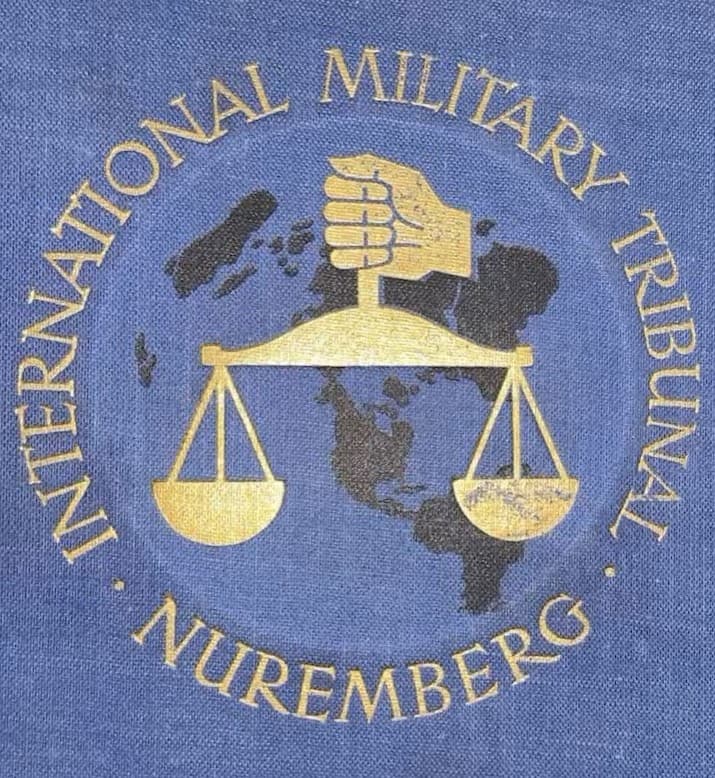Wiener Kurier (April 3, 1946)
Ribbentrop in Nürnberg:
‚Ich war immer ganz anderer Ansicht als Hitler!‘
Nürnberg (DANA) - Oberst John Amen, der amerikanische Ankläger, nahm Ribbentrop im Verlaufe der Dienstagmorgensitzung ins Kreuzverhör.
„Wissen Sie, weis man unter einem ‚Yesman‘ versteht?“ fragte Oberst Amen den Zeugen
Ribbentrop antwortete: „Das ist ein Mann, der zu allen Dingen ‚Ja‘ sagt, auch wenn sie nicht seiner eigenen Überzeugung entsprechen.“
Amen: „Und Sie waren Hitlers ‚Yesman‘?“
Ribbentrop: „Ich sah in Hitler das Symbol Deutschlands und den einzigen Mann, der den Krieg gewinnen könnte. Ich habe seine Befehle treu befolgt, obwohl ich restlos anderer Ansicht war als er.“
Himmler und Ribbentrop schrieben einander Geburtstagsbriefe
Über seine Beziehung zu Himmler äußerte Ribbentrop, daß er in den ersten Jahren des Nationalsozialismus gut mit ihm gestanden habe. Später hätten sich die Beziehungen leider verschlechtert. Vom Jahre 1941 an habe nach außen hin allerdings eine herzliche Zusammenarbeit bestanden, und sie hätten einander auch immer Geburtstagsbriefe geschrieben, aber „innerlich“ sei das Verhältnis schlecht gewesen.
„Wie aus den Aufzeichnungen Himmlers hervorgeht, sind Sie doch während des Jahres 1941 noch über fünfzigmal mit ihm zusammengekommen“, fragte der amerikanische Ankläger, „und bei all diesen Zusammenkünften soll Himmler ihnen nie etwas über die Konzentrationslager erzählt haben, die sein Hauptarbeitsgebiet waren?“
Ribbentrop erwiderte hierauf, er könne seine Aussage nur wiederholen, daß er niemals etwas von Konzentrationslagern gewußt habe.
‚Deutschland hat keine Angriffskriege geführt‘
Nach Oberst Amen stellte der sowjetische Ankläger General Rudenko einige Fragen an Ribbentrop.
Rudenko: „Halten Sie den deutschen Einmarsch in Österreich für eine Aggression?“
Ribbentrop: „Nein, es war der Wille des österreichischen Volkes, der von uns vollzogen wurde.“
Rudenko: „Halten Sie den deutschen Einmarsch in die Tschechoslowakei für eine Aggression?“
Ribbentrop: „Nein. Der Führer hat mir gesagt, daß die geographische Lage Deutschlands ein Eingreifen erfordert. Die Tschechei sei eine Art Flugzeugmutterschiff gegen Deutschland.“
Rudenko: „Halten Sie den deutschen Angriff auf Polen für eine Aggression?“
Ribbentrop: „Nein. Unser Vorgehen war durch die Haftung der anderen Mächte unausweichbar geworden.“
Ribbentrop leugnete ebenso, daß der deutsche Überfall auf Dänemark, Norwegen, Holland, Belgien, Luxemburg, Griechenland und Jugoslawien eine Aggression dargestellt habe, da der Führer ihm sagte, diese Vorsichtsmaßregeln seien im Interesse Deutschlands notwendig.
Auf die Frage, ob er den Angriff auf die Sowjetunion für eine Aggression halte, antwortete Ribbentrop zögernd: „Im landläufigen Sinne war es keine. Der Führer sagte mir, die Ostwestzange, das heißt Rußland auf der einen, die westlichen Alliierten auf der anderen Seite, stellte eine große Gefahr dar und so habe er denn das Präventivunternehmen des Angriffs auf Rußland als notwendig erkannt.“
Anschließend erklärte Ribbentrop, Hitler habe die Lage schon zu Beginn des Krieges nicht mehr in der Hand gehabt, sondern sei von militärischen Notwendigkeiten gedrängt worden. Er habe nicht anders gekonnt, als so zu handeln, wie er gehandelt habe.
Hitler verlangte Abtransport von 50.000 Juden aus Vichy-Frankreich
Der französische Anklagevertreter Edgar Faure nahm sodann Ribbentrop ins Kreuzverhör. Ribbentrop betonte, er sei auch in Hitlers Politik gegen die Juden ein getreuer Gefolgsmann des Führers gewesen, behauptete aber, er habe stets versucht, Hitlers Maßnahmen abzuschwächen.
Auf die Frage Faures, ob der ehemalige deutsche Botschafter bei der Vichy-Regierung, Otto Abetz, mit dem Raub von Kunstschätzen, besonders aus dem Louvre, beauftragt worden sei, entgegnete Ribbentrop, dies sei nicht der Fall gewesen.
Der französische Ankläger legte einen Brief der deutschen Botschaft in Vichy an den Chef der SS und des SD in Frankreich vom 27. Juli 1942 vor, aus dem hervorgeht, daß Hitler den Abtransport von fünfzigtausend Juden aus dem unbesetzten Frankreich nach dem Osten verlangte. Ribbentrop behauptete, hier im Gerichtssaal zum erstenmal von diesem Unternehmen etwas gehört zu haben.
Auch von der Arbeitstagung der Judenreferenten und Arisierungsberater, die auf Anregung Ribbentrops am 3. und 4. April 1944 in Krummhübel stattfand, und bei der der ehemalige Gesandte Schleier die Schaffung eines jüdischen Abreißkalenders vorschlug, will Ribbentrop nichts gewußt haben.
Madagaskar, die Verbannungsinsel für Juden
Weiter führte Ribbentrop aus, daß der Plan, die Juden mach Madagaskar zu evakuieren, von Hitler stammte. Es sei überdies in Deutschland allgemein bekannt gewesen, daß die Juden in Reservationen angesiedelt werden sollten. Auch er habe davon gewußt und von Hitler den Auftrag erhalten, der italienischen Regierung nahezulegen, das gleiche zu tun.
Ribbentrop bestritt ebenfalls, Horthy geraten zu haben, die Juden totzuschlagen oder in Konzentrationslager zu stecken. Als der Vorsitzende, Lordrichter Lawrence, ihn hierauf fragte, ob er nicht bei Horthy die Verschickung der Juden in Konzentrationslager gefordert habe, gab Ribbentrop zu, dies im Aufträge Hitlers getan zu haben. Da in Budapest besonders viele Juden gewohnt hätten, habe Hitler gefordert, die Juden in einen Teil der Stadt zu konzentrieren.
Auf eine abschließende Frage Edgar Faures äußerte Ribbentrop, die zahlreichen Verhaftungen von französischen Zivilisten seien vorgenommen worden, weil man im Falle einer Invasion vor gefährlichen Elementen sicher sein wollte.












